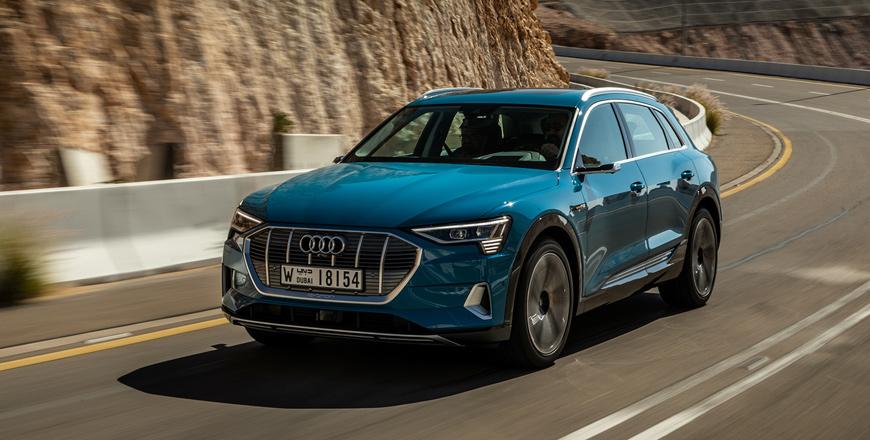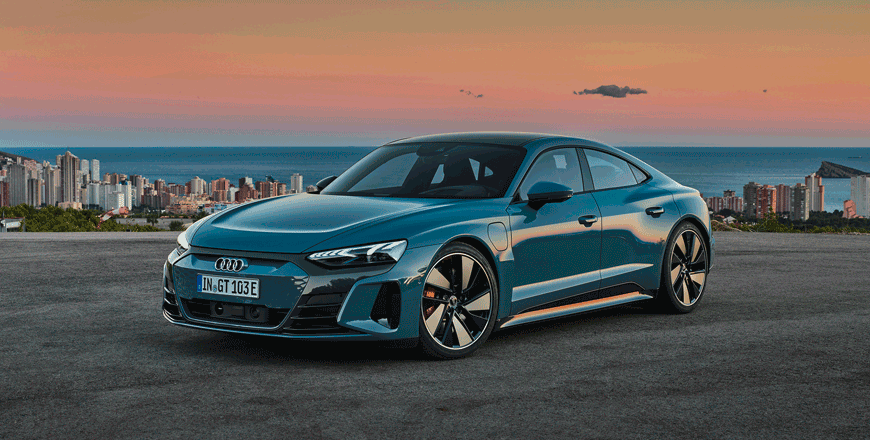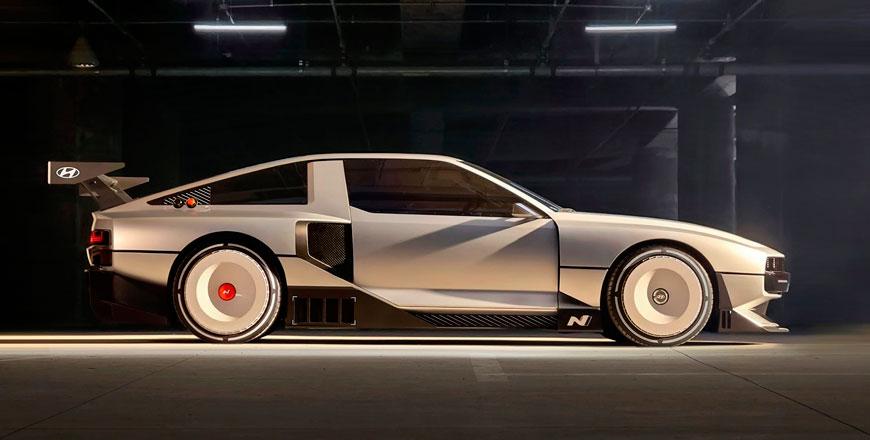You are here
Audi E-tron 55 Quattro: Electric evolution
By Ghaith Madadha - Jan 21,2019 - Last updated at Jan 21,2019

Photo courtesy of Audi
The Ingolstadt automaker’s first fully electric vehicle (EV), the Audi E-tron just might be the most well-rounded production EV. Walking a fine line between the futuristic and the familiar but with a distinct flavour and dedicated model line the E-tron naturally slots in Audi’s extensive SUV line-up in terms of design, character and size.
Technologically advanced and thoroughly well thought out the E-tron posts impressive technical achievements including range, energy recuperation and thermal management, but what most impressed was its versatility, energy management at heavy load and how normal yet accomplished it feels to drive.
Assertive and grounded
Seemingly slotting in somewhere between an Audi Q5 and Q8 in terms of size and design, the E-tron also shares the same basic design language as its conventional SUV sister models. The E-tron does, however, carve its own unique themes starting from its sharp and squinting LED headlights and how light itself is incorporated into the fascia and grille slat design, which are also reflected in the alloy wheel styling. Octagonal like other Audi SUV grilles, the E-tron’s single frame unit features multiple small slats and a unique platinum grey finish.
Assertive on the road, the E-tron features a long roofline with a big rear tailgate spoiler. Blistered wheel arches hark back to the original Quattro and hint at its four-wheel-drive and are complemented by wraparound haunches for a more muscular appearance emphasising its width.
Contoured black sills meanwhile emphasise the E-tron’s grounded appearance and weighting, and even feature exterior elements alluding to its heavy 700kg batteries low and central under-floor position for a low centre of gravity within a long wheelbase for stability and interior legroom.
Aero aesthetic
Built on a heavily modified platform originating from the long wheelbase Audi Q5 and featuring rigid aluminium-intensive construction, the E-tron is, however, a unique car among the Audi line-up. Its low mounted batteries are liquid-cooled for efficiency and are contained within an enclosed aluminium structure to help improve the E-tron’s structural rigidity for handling, ride and safety.
Underneath, the batteries are protected by a flat and tough aluminium plate. With battery and suspension covers underneath, the E-Tron also achieves excellent aerodynamic efficiency, which is also aided by variably opening cooling vents and even specially designed underbody bolts.
Achieving low 0.28 aerodynamic drag coefficiency in standard guise, the E-tron can be optionally fitted with a virtual mirror system, which comprises slim side ‘mirror’ stalks with cameras replacing the actual mirrors and projecting rearview images on two high definition screens located in the interior door panels.
Virtual mirrors reduce aerodynamic drag to 0.27, and account for up to an additional 35km range or the equivalent of a half tonne weight reduction. Positioned close to where normal mirrors are positioned, the virtual mirror screens provide excellent night time visibility, with the passenger side screen being particularly intuitive to view.
Seamless surge
Putting power to tarmac through a modern interpretation of Audi’s defining Quattro four-wheel-drive in the form of two separate but electronically fully integrated and networked motors and single-speed gearboxes driving the rear and front wheels, the E-tron delivers confident all-weather road-holding and tenacious traction, as expected.
Driving with a rear bias in normal conditions, with the front wheels pitching in when more power or road-holding is required through quick corners or on low traction road and off-road surfaces, the E-tron develops a combined output of 355BHP and 413lb/ft torque constantly for up to 60-seconds, and is thus capable of achieving 0-100km/h in 6.6-seconds and an electronically-limited 200km/h top speed.
The E-tron can harness a combined boosted maximum of 402BHP and 489lb/ft for 8-second bursts in S drive mode, during which 0-100km/h acceleration drops to a brisk 5.7-seconds, with front motor power rising from 167BHP and 182lb/ft to 181BHP and 227lb/ft, and at the rear from 187BHP and 231lb/ft to 221BHP and 261lb/ft. With its deep, near instant and seemingly ever present and deep well of torque and seamless surge of power, the E-tron’s off the line response and eager, consistent and muscular delivery on steep inclines and in overtaking manoeuvres proved impressive during test drive in Abu Dhabi and on the demanding Jebel Hafeet hill climb.
Range and regeneration
Swift, smooth and versatile in how it drives, the Audi E-tron’s electric quoted 417km and real world driving range is impressive, and especially in how comparatively little electricity is used during hard driven, high altitude hill climbs, which usually leads to a significant surge in energy consumption in most EVs.
In terms of recharging its batteries, the E-tron can be fully charged in as little as 30-minutes using a high capacity 140kwDC charger, or in 8-hours and a half using an 11kw 400v charger. Capable AC/DC charging the E-tron’s domestic charge time can also take less or more time, depending on charger and output available.
Meanwhile, the E-tron’s regenerative brakes can recuperate up to 220kw of electric power and operate without conventional mechanical brakes at up to 0.3g. However, the E-tron can be driven in different modes of energy recuperation, and unlike many other electric cars, this includes a free coasting mode useful for highway driving and more intuitive sporty driving when lift-off deceleration is not desired.
For town driving and descents, one can opt for more regenerative braking, and can ease off the accelerator pedal to reduce speed in most circumstances, while temporary brakeforce recuperation levels can be adjusted from a steering column stalk.
Smooth and silent
Smooth and stable at speed, the near silent Audi E-Tron is a comfortable and capable long distance cruiser, and is meanwhile easy to drive and comfortable in town, where its sophisticated five-link air suspension compensates for huge 20-inch alloy wheels and provides a comfortably absorbent yet settled ride.
With so much weight concentrated so low and within the wheelbase for near perfect 50:50 weighting and a low centre of gravity, the E-Tron seemed to belie its 2.5-tonne mass through winding hill climbs where it felt balanced and grounded, with little comparative body roll. Entering corners with little hint of understeer, the E-Tron’s steering was direct and well weighted.
With selective braking torque vectoring helping the E-Tront tuck tidily into corners and its quick response electronic four-wheel-drive apportioning power between front and rear, the E-Tron was confident through switchbacks.
Refined, quiet and classy inside, the E-Tron’s adaptive air suspension can meanwhile raise ride height to 207mm for improved off-road angles and ability.
Extensively equipped with comfort, convenience, safety and driver assistance systems, the E-Tron’s stylishly high tech cabin features dual infotainment screens, configurable instrument panel and quality upholstery and trim. Spacious inside despite the battery position below, the E-Tron also accommodates a minimum of 660-litres of cargo, which expands to 1,725-litre.
TECHNICAL SPECIFICATIONS
Engine: Front- & rear-mounted electric motors
Gearbox: single-speed automatic, four-wheel-drive
Transmission ratios, F/R: 9.205: /9.083:1
Final drive: 9.205:1
Power, BHP (PS) [kW]: 402 (407) [300]
Power-to-weight: 161.4BHP/tonne*
Torque lb/ft (Nm): 489 (664)
Torque-to-weight: 266.6Nm/tonne*
0-100km/h: 5.7-seconds
Top speed: 200km/h (electronically governed)
Driving range, combined WLTP: 417km
Charging time, high capacity fast charger: 30-minutes @150kW DC
Home Charging: 8-hrs, 30-min @11kW, 400v
Other charging options: 2.3kW @230v, @22kW @400v, AC/DC charging
Battery: Lithium-ion, 95kWh
Battery weight: 700kg
Length: 4,901mm
Width: 1,935mm
Height: 1,616mm
Aerodynamic drag co-efficiency: 0.27 (as tested)
Unladen/Kerb weight: 2,490kg/2,565kg
Towing : 1,800kg
Cargo volume, min/max: 660-/1,725-litres
Steering: Electric-assisted speed sensitive rack & pinion
Turning circle: 12.2-metres
Suspension: Five-link, anti-roll bars, air suspension Brake, F/R: Ventilated discs 375mm/350mm, kinetic regenerative braking
Tyres: 255/50R20 or 265/45R20 (both optional)
*Unladen
Related Articles
A late coming competitor to the Tesla Model S ubiquitous to the sporting coupe-like low-roof EV executive saloon segment, the Audi E-Tron GT
By Ghaith Madadha Powerful, yet, bland, electric vehicles (EV) are hailed as the future of clean motoring by some, but derided by other
Even on the eve of its demise by year’s end as Audi barrels along into a fully electric future, the R8 remains the singularly most exciting














